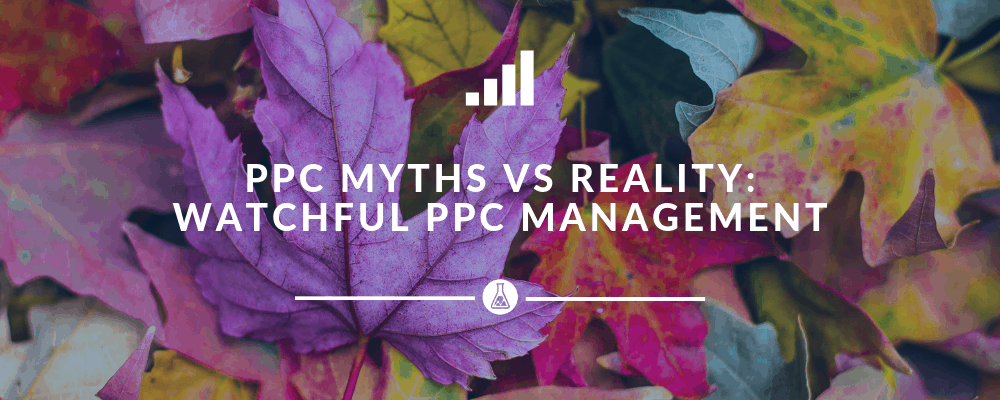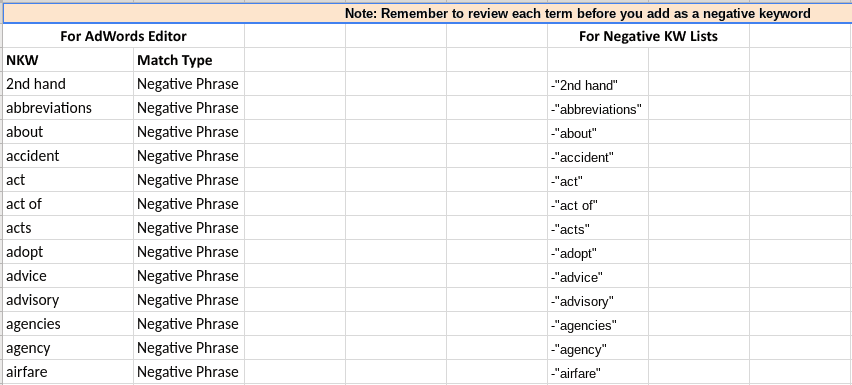Welcome to PPC Myths vs. Reality, a series with the goal of equipping our readers and our YouTube subscribers with tested advice for running successful PPC campaigns.
Make sure to subscribe to the Search Scientists YouTube channel, so you don’t miss out on any of the PPC Myths vs. Reality videos.
Something we talk to new clients about a lot is watchful PPC management and account activity.
There’s a myth floating around out there that 90% of the work with PPC is done in the first month – set it and forget it.
Today Jessica is going to show you just a couple of reasons why that’s wrong.

Video Transcript
Quality score & relevance score
One of the biggest and most important metrics in paid traffic is Quality Score on AdWords and Relevance Score on Facebook. Both of these can make or break an account. While sometimes you get lucky, hit the jackpot, and instantly get a great score, most of the times you need to do lots of testing to get it right.
The biggest influence on it is engagement – represented by CTR, Interaction Rate, Engagement Rate (on Facebook).
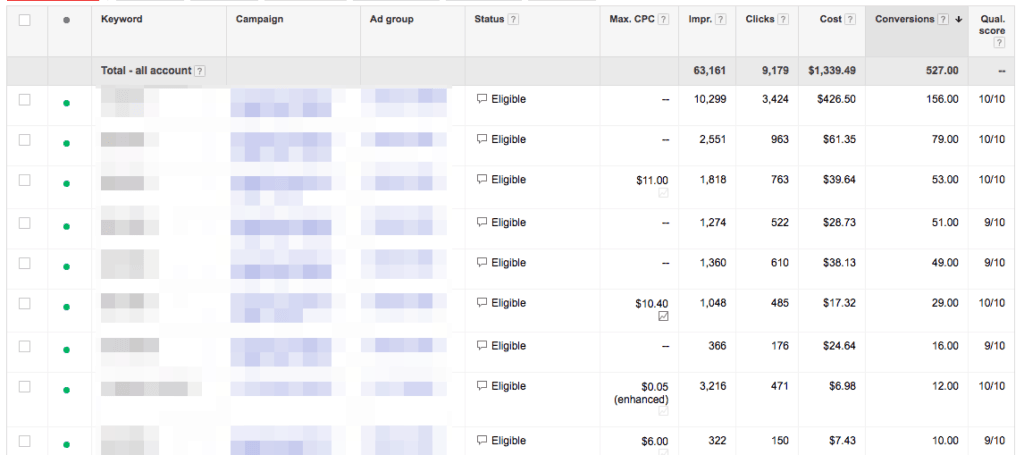
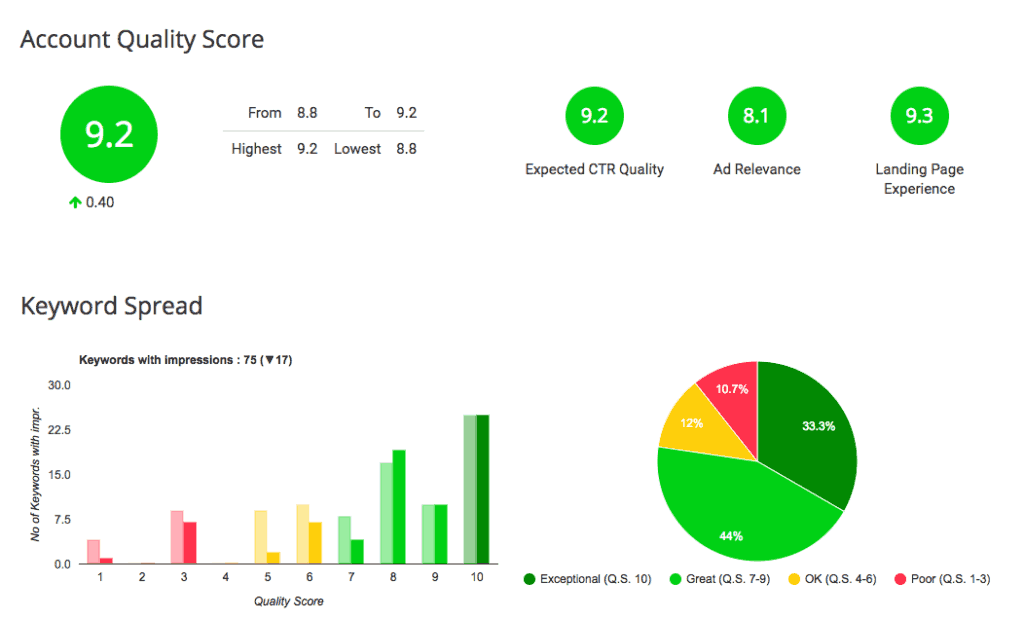
As you test different ad copy or images, your CTR goes up and AdWords and Facebook will reward you with a high Quality or Relevance Score, which gives you a massive discount.

We’ve worked on campaigns for months to crack the code, but once you get it, your CPC drops and your traffic increases. But again, it takes a lot of time to allow for testing to get it right.
Wasted Ad Spend
Another big area where watchful PPC management is very important is Wasted Ad Spend.
We all know the concept of Keyword Testing – launch 10 keywords, some will convert right away, some need to be optimized and some will never convert. We talked about Keyword Testing in the previous PPC Myths vs. Reality article, go check it out.
If you were to just launch your keywords and let them ride over time, even if you’re looking at it once a month, in the course of that month, you could potentially waste hundreds or thousands of dollars on these terms. Keywords can nickel and dime you – each one might cost only 10 or 20 dollars, but combined, that really adds up.
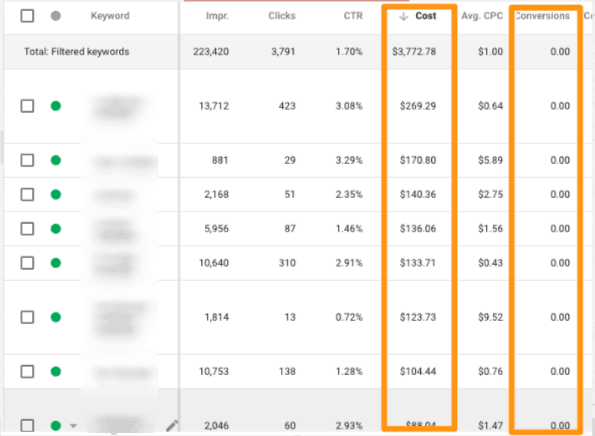
Here’s a case with $3,700! in wasted ad spend
PPC ACCOUNT ACTIVITY
Wordstream analyzed 10s of 1000s of AdWords accounts and found that out of all the metrics out there, PPC account activity is the most important for maintaining a healthy account.
Simply opening up the account and looking at it, asking yourself what you can do to push it forward, testing new ad copy and keywords, doing more bid optimization, makes for better paid traffic management. You catch things faster, you think about improvement more often.
This is an example of our project management board for a client. It’s a great way to keep track of what’s happening inside an account on a daily basis.

At Search Scientists, we’re creating a Periodic Table of PPC, our encyclopedia of how great PPC is done.
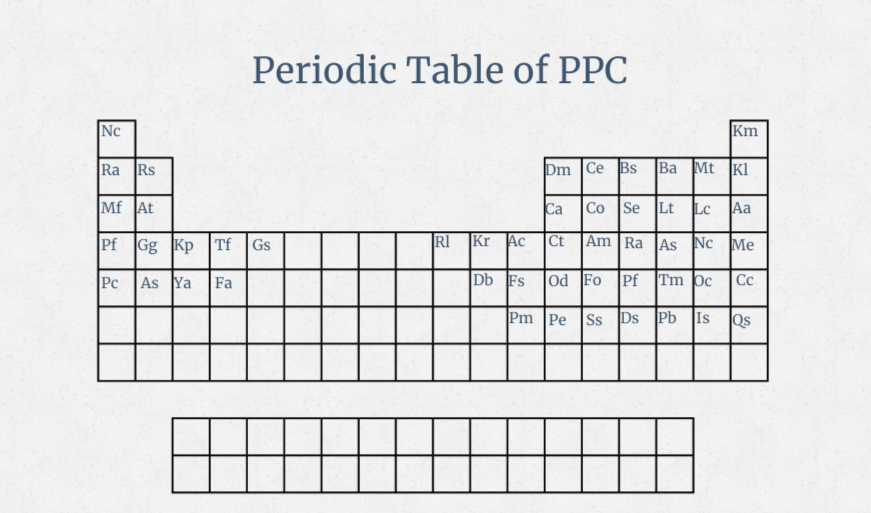
When we add an element, we always include what day of the month it should be done, whether it should be done more than once per month, how long it should take.
There’s hundreds of things you can do inside an account, and we want to be sure we’re hitting the biggest metrics first and frequently. If you want more info on our Periodic Table of PPC, be sure to subscribe to our newsletter below.
How Watchful PPC Management Helps Spot and Fix Problems in Real-Time
Managing PPC campaigns on platforms like Google Ads or Facebook can feel like you’re steering a ship through unpredictable waters. Watchful PPC management means you’re always on deck, spotting problems before they sink your budget.
The strategy here? Set up automated alerts for any dips in performance—whether it’s click-through rate (CTR) plummeting or cost-per-click (CPC) skyrocketing. Combine that with a daily habit of checking search term reports and ad performance metrics.
In practice, it looks like this: you’re continuously monitoring for wasted spend by identifying underperforming keywords, pausing irrelevant search terms, and reallocating budget to high-converting ads.
I hope this dispels the PPC myth that you can set it and forget it with your ads, because you absolutely cannot. Quality Score, Relevance Score will never go up without lots of ad testing, and your wasted spend will chew away at your profitability if you don’t keep a watchful eye on your account.
We hope you guys join us soon for the next PPC Myths vs. Reality video. And don't forget to subscribe to the Search Scientists YouTube channel.
Bid Adjustments Based on Performance
One of the first things to monitor is your bid strategy. If you notice certain keywords are consistently underperforming (high CPC but low conversions), it’s time to lower your bids. On the flip side, increase bids on keywords that are driving conversions to stay competitive.
If a keyword is draining $10 per click but not converting, you lower the bid and push that budget toward high-converting keywords that cost less but bring results.
Negative Keyword Lists
Adding negative keywords is a game-changer. If your ads are being triggered by irrelevant search terms, they’ll burn through your budget fast. Regularly check search term reports to identify non-relevant terms and add them as negative keywords. This way, you avoid paying for clicks that won’t convert.
Іf you’re selling high-end watches and keep getting clicks for “cheap watches,” add “cheap” to your negative keyword list to filter out unwanted traffic.
Here is an extensive list of Universal Negative Keywords that you will find useful. It contains 800 negative keywords that will very likely be irrelevant for your business.
A/B Testing Ad Copy
Don’t set your ads and forget them. Continuously A/B test ad copy to see what resonates better with your audience. Test different headlines, call-to-actions, and descriptions. This constant tweaking can improve your click-through rate (CTR) and overall performance.
Run two variations of an ad—one highlighting a discount and the other emphasizing free shipping—and see which one drives better conversion rates.
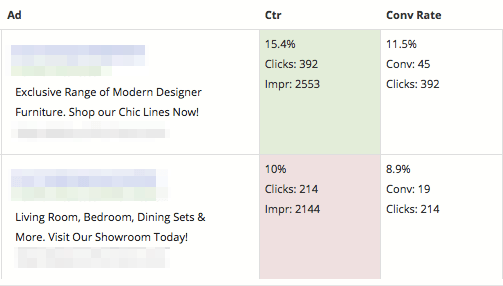
Audience Targeting Refinement
Use data to continuously refine your audience targeting. Analyze which demographics or segments are converting best and adjust your targeting settings accordingly. If certain age groups or locations aren’t performing, adjust your bids to reduce spend on those segments.
If 18-24-year-olds aren’t converting as well as 25-34-year-olds, lower your bids for the underperforming age group or exclude them entirely.
Geo-Targeting Optimization
Review your location data. If certain regions or cities are bringing in higher conversion rates, it might be worth adjusting your geo-targeting to spend more in those high-performing areas while reducing or excluding spend in regions that aren’t delivering results.
If your campaigns perform better in urban areas, increase bids in cities and reduce or cut bids in low-performing rural areas.
Dayparting (Ad Scheduling)
Not all hours of the day or days of the week perform equally. Analyze your performance data to identify when your ads get the most conversions, and schedule your ads to run during those peak times. This avoids wasting budget during hours when your audience is less likely to engage.
If your conversions spike between 12 PM and 6 PM, set your ads to run only during those hours and pause them outside of that window.
Conversion Tracking & Attribution
Set up detailed conversion tracking to know exactly which clicks are turning into sales. This allows you to properly attribute success to the right ads and keywords. Use data-driven attribution models to get a clearer picture of the customer journey and allocate budget more efficiently.
Implement Google Ads conversion tracking to identify which ads are driving leads, and adjust your budget to focus on those high-performing assets.
We live, breathe & Dream Paid Traffic
Summary
Watchful PPC management is all about keeping a close eye on your campaigns so they don’t go off the rails.
The key strategies? You adjust bids when a keyword is eating up budget but not converting, add negative keywords to filter out useless clicks, and run A/B tests to find the best ad copy. You also refine your audience targeting and schedule ads to run during peak hours, so you’re spending money where it counts.
In short, you’re always in control, fixing problems before they cost you big—like a superhero swooping in just in time (cape optional). Keep things watchful, and your campaigns will stay profitable and efficient.
Check out more blog posts:




